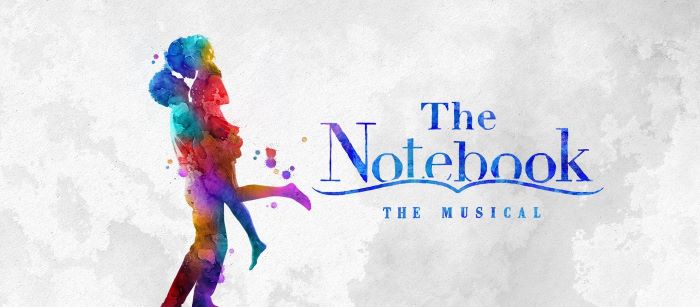Broadway’s new musical re-envisioning of The Notebook by Ingrid Michaelson (music and lyrics) and Bekah Brunstetter (book), based on Nicholas Sparks’ bestselling debut novel of 1996, and the blockbuster 2004 film adaptation of the same name, requires a suspension of disbelief and a taste for excessive sentimentality to appreciate the production. Now playing a limited engagement at the Schoenfeld Theatre, the romantic tear-jerker (the concession stand even sells little branded boxes of tissues) has been reset from the 1940s to a more recent time, some of the details have changed, but the basic premise of a lifetime of love and union in death, despite manipulations and medical conditions that would have torn them apart, remains the same.
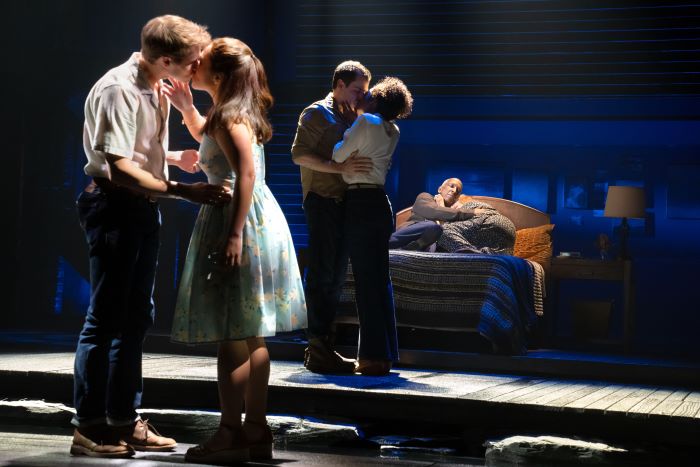
The non-linear tale shifts back and forth in time, from a present-day nursing home where the older Noah (Dorian Harewood), notebook in hand, reflects on the memories transcribed in the titular journal and reads from it to an elderly and confused Allie (Maryann Plunkett), currently in the last stages of dementia, with the hope of jogging her memory. It recounts their history together, from the first meeting of their teenage selves (John Cardoza and Jordan Tyson) during a summer in the late 1960s, when, although from different places and classes, they shared an instant attraction, to their reconnection and marriage in the late ‘70s (with the couple now played by Ryan Vasquez and Joy Woods), after a ten-year estrangement, predictably engineered by her controlling and condescending mother (Andréa Burns), who thought her college-bound daughter could and should do better than to be with a laborer in a lumber mill, with no plans for an advanced education or a high-income, high-profile future (though, it should be noted, he’s amazingly poetic and articulate in expressing his feelings for Allie and in profoundly analyzing her painting, which she gifts him, as expressing both her “Sadness and Joy”).
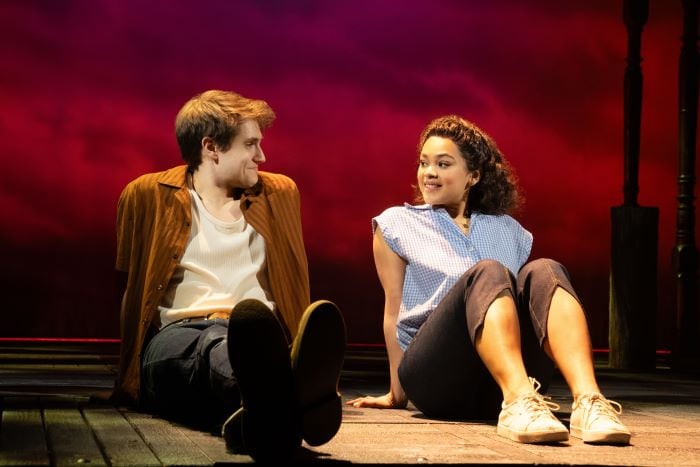
Then, out of the blue, the domineering mom saves the day in the 1970s, with a sudden appearance and inexplicable reversal, admitting what she did to keep them apart (handing over to her daughter the evidence she incomprehensibly saved!) and telling Allie, now engaged to the lawyer Lon (Chase Del Rey) and about to be married in a few days, to decide for herself what she wants to do and who she wants to be with, after pushing and commanding her for her entire life. Okay. And, after some hesitation, she does. (Not exactly a spoiler here, since most audience members are already familiar with the story, and if not, have seen repeatedly throughout that the elderly couple is together and obviously ended up with each other, with an ending that I won’t reveal but is completely, and mawkishly, beyond belief).
Under the direction of Michael Greif and Schele Williams, the storytelling, sometimes read, mostly reenacted, and frequently in the form of the figures of Noah and Allie at different ages simultaneously appearing in their older minds and moving aimlessly around the stage, is often redundant, interspersed with 22 songs (with arrangements by Ingrid Michaelson and music supervisor Carmel Dean, orchestrations by John Clancy and Dean, and music direction by Geoffrey Ko) that add little to the advancement of the plot or character development but mainly serve to reiterate their giddy feelings for each other. And the casting is visually inconsistent (and initially can be unclear), with actors who bear little physical resemblance to one another playing the same characters in the three stages of their lives.
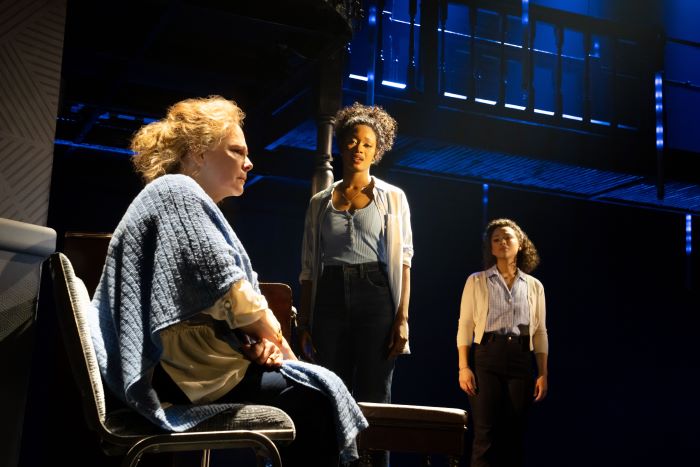
Among the standouts in the cast are Plunkett as Older Allie, masterfully capturing the mental decline and confusion, frustration and anger of a woman suffering from dementia and desperately trying to remember, then rejoicing with the love of her life when she does; Harewood as the devoted, tender, and adoring Older Noah, who never gives up on his wife and their undying love and commitment, even after experiencing a medical emergency of his own; Joy Woods as Middle Allie, embodying the wistfulness, pain, and uncertainty of her separation from Noah and the lightheaded ecstasy of their reunion, and performing the show-stopping number “My Days” and the ebullient dance in the rain (choreography by Katie Spelman), based on the familiar scene from the movie; John Cardoza as Younger Noah, who embraces the spirit of youthful passion and delivers terrific folk-pop vocals while accompanying himself on guitar; and Carson Stewart as Johnny, the young physical therapist assigned to the resistant Noah, who adds comic relief with his enthusiasm and inexperience, and his reaction to the amorous passages of the notebook, which he reads aloud.
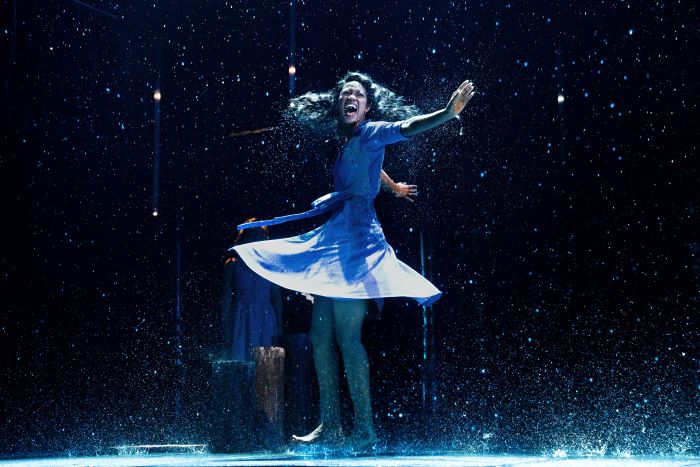
Rounding out the ensemble are Yassmin Alers, Hillary Fisher, Dorcas Leung, and Charles E. Wallace as their friends, family members, and care providers, with Burns also appearing in the more likeable and compassionate featured role of Nurse Lori, who enables the ailing Noah to go to his wife’s room for the night while she’s busy doing her rounds, thereby providing the extremely sentimental ending that elicited audible reactions from fans at the performance I attended (and presumably at every performance).
The set by David Zinn and Brett J. Banakis, with projections by Lucy Mackinnon, transition fluidly from the nursing home to the coastal pier and waters where Noah and Allie met, the house he restored for them, dinners with her parents, the deluge of a thunderstorm, and the vague recesses of their minds and memories, with sound by Nevin Steinberg, and dark dramatic lighting and spotlighting by Ben Stanton (and the strange element of vertical fluorescent-style bulbs hanging above, then pendant Edison bulbs to signify the historic house). Costumes by Paloma Young, and hair and wigs by Mia Neal, are mildly indicative of the times and the stations of the characters, without being overly specific, presumably to lend a timeless universality to the emotional narrative.
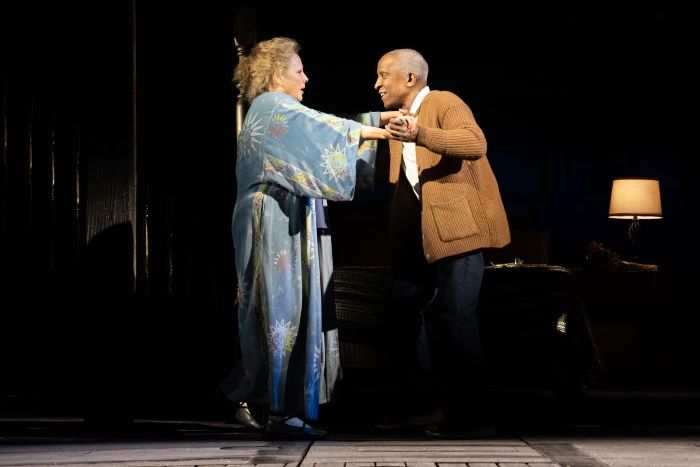
If you’re an aficionado of the book and movie, and you love sentimental stories of eternal love and romance, The Notebook will undoubtedly tug at your heartstrings and bring on the tears, and the payoff of choosing what’s right for you, and being committed to who you love, no matter what others tell you to do, is a message that will resonate. Others will likely find it overly cloying, contrived, and obvious.
Running Time: Approximately two hours and 20 minutes, including an intermission.
The Notebook plays through Sunday, July 7, 2024, at the Schoenfeld Theatre, 236 West 45th Street, NYC. For tickets (priced at $84-344, including fees), call (212) 239-6200, or go online.


